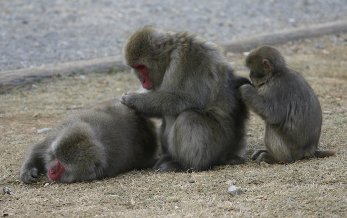As the year comes to a close its time to reflect upon the previous year’s climate related news. I mean who doesn’t love a good end of year “The best of” list?
So what made headlines? What events mattered? And crucially what shaped the public’s understanding of climate change?
In order to address the above questions I’ve selected what I believe are the top six “breakthrough” climate stories of the year. These are the issues that had a strong influence on the public’s understanding of climate change.
I’m confident we’ve witnessed an important shift in the climate debate as (a) evidence of rapid global warming has manifested with a vengeance and (b) the majority of the public now accept the reality of global warming.
But what caused this shift? Ultimately the climate stepped in to adjudicate the debate.
In a year of record temperatures and super-storms, the physics of climate change demonstrated its reality.
And while the debate between sceptics and warmists will grind on for several more years it was the evidence presented in the form of drowned cities, withered crops and searing temperatures that shaped public perception.
1. It’s global warming stupid: Hurricane Sandy and the North American summer. And the drought. And the derecho storm. And killer tornadoes. And wildfires.

Perhaps it was the thousands of temperature records smashed, the devastating drought that gripped large sections of the United States, the rare derecho storm that lead to millions losing power or the hundreds of tornadoes that that ripped through the country that taught millions of Americans the climate was changing. Let’s not forget the wildfires either.
By the end of 2012 the belief the climate was not changing became untenable. An overwhelming majority of the American public now accept the reality of climate change (up to 70% according to Business Week).
And then there was Sandy. Who can forget the images of a devastated New York and East Coast?
Not only did Sandy influence the US Presidential election in painting Mitt Romney and the Republicans as the party in dangerous denial – they had a good chuckle about climate change at their convention – it also tangibly and tragically demonstrated what to expect from a climate spinning out of control.
2. Red alert: Greenland melt accelerates

There are troubling things happening up north, not least of all the record breaking seasonal melt for Greenland in August of this year. And while some claimed this news was insufficiently reported in the mainstream press (of which there is some truth) bloggers, tweeters and social media activists did the job for them.
While the fourth estate slept, denizens of what I’d like to call the fifth estate (social media content creators) stepped in to spread the word.
3. Going, going, gone: Arctic sea-ice reaches lowest minimum

If you want to know what the Arctic’s death spiral looks like merely cast your eyes over the above graph. George Monbiot said it best: “Stupidity, greed, passivity? Just as comparisons evaporate, so do these words. The ice, that solid platform on which, we now discover, so much rested, melts into air. Our pretensions to peace, prosperity and progress are likely to follow…”
And how did humanity react to this worrying trend? Giving fossil fuel companies license to rush in and explore for more oil.
4. Apocalypse averted: the Carbon Tax debate fizzles out

The end product of the merchants of hate (source News)
In the coming decades, future generations will puzzle over how the Australian political system almost imploded over the fight to introduce a price on carbon.
The Murdoch press ran an orchestrated campaign against the tax while right-wing radio shock jocks worked up the angry masses into even greater levels of well.. anger. The Federal Opposition Leader, Tony Abbott, ran a two year fear campaign against the tax claiming “We will be rooned, roooooned!”
Australian political debate reached a new low with nasty catch phrases such as “Juliar” (in reference to Australia’s Prime Minister Julia Gillard) entering the popular lexicon and radio presenter Alan Jones claiming climate science was “witchcraft”.
The forces arrayed against the tax included private think tanks, News Ltd, the Liberal National Party, large segments of the resources sector and eccentric billionaires such as Gina Rinehart.
And yet the government managed to get the legislation through both houses of Parliament. In retrospect it is amazing the minority Gillard government didn’t collapse and still manage to introduce a price on carbon – something that had eluded previous governments for almost 20 years.
So did the world end? Did Australia become an improvised, backwards economic wasteland? Are we Aussies now all living in caves, desperately missing hot showers and street lighting?
Rest assured – the world didn’t end, the sun is still shining and industrial civilisation didn’t collapse as the sceptics warned us.
5. It’s worse than you think: PWC, World Bank reports and news of the permafrost melting

Imagine you’ve just been told by your doctor you have cancer: you’ve got maybe five years. But with treatment you could extend your life well beyond that.
You’d be alarmed and no doubt take positive steps to address the issue: you’d undergo medical treatment, change your diet, exercise and consider changing you life.
Who want’s to die prematurely? Or maybe you’d still be in denial.
Either way, you’re presented with this information and the opportunity to act.
But a month after being told the above, you return to see your doctor only to be told he was wrong. A new round of tests conclusively proves you’ve got a year – maybe two.
“So sorry…” states your doctor “…but the cancer is far more aggressive. Fortunately we’ve caught it early due to some new technology and diagnostic methods. But we need to start treatment right away.”
This is the situation humanity faces.
In the past six months a series of reports and a rash of new scientific evidence has been presented that makes for alarming reading:
It not just the IPCC or those radical socialists otherwise known as “climate scientists” saying the climate is changing more rapidly than anticipated. Some of the most conservative institutions and corporations have joined the chorus for urgent action by signalling their alarm.
Which means either one of two things: the need to act is increasingly urgent or that every scientific, political, media, business and professional association is part of the conspiracy.
6. No sympathy for the devil: Peter Gleick disembowels the Heartland Institute

I believe scientist Peter Gleick did humanity a favor, even if his methods were controversial.
Gleick obtained key strategy and planning documents from The Heartland Institute – the US libertarian think tank – by pretending to be one of its board members. He simply called up reception and asked for documents to be sent to an email account.
Was it worth it?
In retrospect, yes.
The documents revealed how Heartland and other think tanks manufacture doubt.
Once the story went viral and was picked up my mainstream media the reputation of Heartland suffered enormously – it lost millions in funding and was forced to cancel their annual conference for sceptics.
Gleick revealed the dark underbelly of the climate sceptic movement: the anonymous funding and the deliberate campaign to deceive.
Sceptics were furious of course – “How dare he, that criminal!” they fumed. Anthony Watts and others threatened to sue Gleick or bring in the authorities- but as suspected, nothing eventuated. Such actions would have brought a level of accountability bodies such as The Heartland Institute seek to avoid.
And that’s just what Gleick did: bring greater transparency and accountability to the climate debate.
The denial movement has been milking Climategate for years. To this day deniers continue to salaciously drool over the half dozen meaningless emails hacked form the University of East Anglia’s Climate Research Unit.
But the public twigged to the hypocrisy: the Gleick episode demonstrated the public has no sympathy for the devil.










